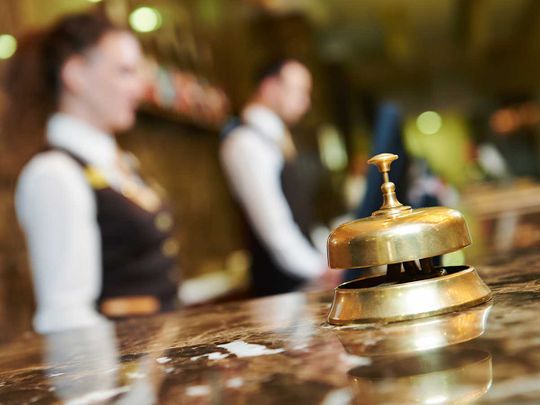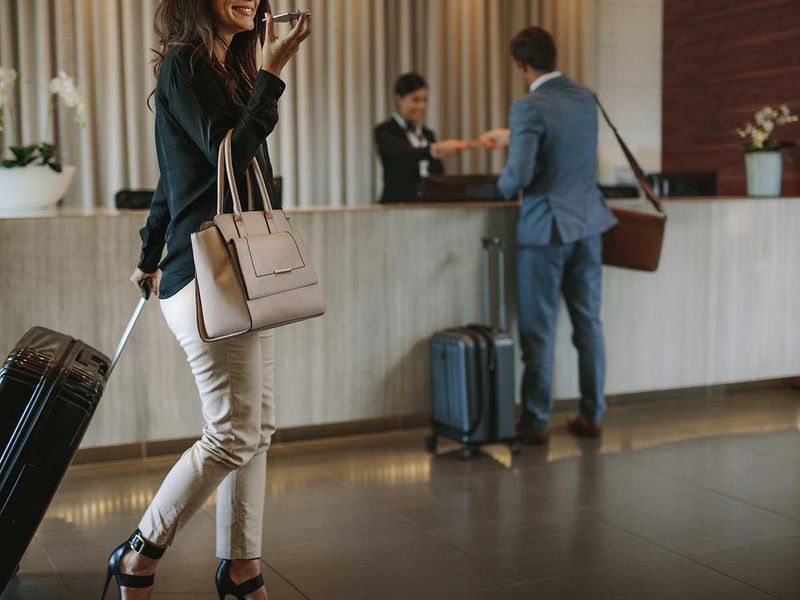
Dubai: Ahead of the crucial Eid holiday break, UAE’s hotels are once again relying on residents and staycation packages to drive occupancy numbers, with rooms at some of the best hotels going for between Dh800-Dh1,500.
If the guest wants to scale down the luxury add-ons, stays can be booked from Dh500-Dh800. In short, there’s a room and a stay available for each budget, as the hotel industry raises their hopes that occupancy levels will climb to 65 per cent during the Eid week. Or even cross 70 per cent from the current 50 per cent plus levels.
Dubai's Palazzo Versace’s staycation offer includes a room or suite, a breakfast buffet at Giardino for two adults and a child, a lunch or dinner set menu for two, 20 per cent discount on all other F&B, and another 20 per cent discount on spa treatments. Offer is valid between May 11 to 15, and start from Dh1,190 plus taxes per room per night, with a minimum two-night stay requirement.
Up in Abu Dhabi, Emirates Palace has a host of culinary and spa experiences from Dh1,430 per night, where guests can also indulge in breakfast and an Eid dinner at Le Vendôme Brasserie.
Perfect blend
“Historically, Ramadan brings a quieter period for the hotel industry,” said Jeroen Elemendorp, General Manager, The Ritz-Carlton, Dubai. “This year, however, we are expecting to see the lines blurred a little more due to a number of factors.
“What’s more, with Ramadan coming earlier and merging into the Spring season, guests are keen to make the most of the weather before the mercury rises. We are expecting our occupancy rates to remain positively consistent over this month.”

Lowest rates
Right now, room rates in the UAE are dropping to their lowest point of the year, which could compel many to try out a staycation package – much like many UAE residents did during the second half of last year. Occupancy levels during the Ramadan weeks were running at 30-40 per cent, according to STR, a hospitality consultancy.
Based on industry feedback, Eid-related bookings suggest occupancy could cruise to the 60-65 per cent range.

What’s more, with Ramadan coming earlier and merging into the Spring season, guests are keen to make the most of the weather before the mercury rises
Vaccines are a big help
According to Aloki Batra, CEO of Five Hotels of Resorts, Dubai being among the most sought-after destinations during the pandemic, will certainly help attract a steady number of travelers through the long summer.
In the UAE, “you have the highest per capita vaccination after Israel and there is strong medical infrastructure,” said Batra. “A lot was built towards Expo 2020… all this will come into play for attracting tourists.”
Given the successful rollout of vaccines, the “worst is over” for UAE’s hotels, said Batra.
Staycations to stay on
Last year, staycations were the number one source of revenue for UAE’s battered hotel industry. Things will not change dramatically this year and beyond.
“We expect it to be a hybrid as the market is very much split between those cautious to travel and those who are eager to explore again,” said Elemendorp. “The staycation market will continue to prove popular over the summer as some residents choose to stay put. However, we expect a rebound of international tourists.”
With the worldwide vaccination efforts underway, there will be demand from key source markets such as Saudi Arabia, the UK and Israel. (The UK is set to flag off resumption of non-essential international travel later this month.)

The worst is over...
Resumption hopes
Prior to the suspension of flights, UK used to be one of the biggest source markets for UAE’s tourism industry. Batra is positive that British tourists will soon be filling up Dubai’s hotels and resorts, especially because there’s a lot at stake.
UK cannot have an indefinite ban in place because one of the biggest casualties would be British Airways, with thousands of employees on its payroll, the executive said. “Step by step you'll have markets opening up - we have seen tourists from Europe and Israel visiting,” said Batra.
Pent-up demand
One factor working out for hospitality - and the aviation - sector will be the pent-up demand for travel. After UK announced a roadmap in February for lifting of COVID-19 restrictions, Marriott International witnessed a 163 per cent surge in booking for its UK hotels in just 24 hours.
“While many of our markets across Europe, Middle East and Africa (EMEA) remain at the mercy of government restrictions, the spikes in booking activity that we see when a travel ban is lifted clearly shows that there is demand out there,” said Satya Anand, EMEA President, Marriott International, during a virtual event earlier this month.
“The Dubai-to-London Heathrow travel corridor was the busiest international air route in the world during the first two weeks of January. And our occupancy rates in Dubai reflected this way and we reached over 70 per cent there.”
UAE’s hotels will be hoping there will be a repeat from later this month. Until then, they have the Eid holidays and staycation guests to look forward to.








